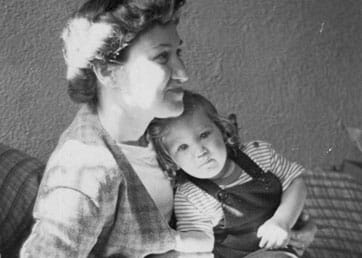
 (WOMENSENEWS)–When my mother was in her 80s, she told me matter-of-factly that she had had an abortion.
(WOMENSENEWS)–When my mother was in her 80s, she told me matter-of-factly that she had had an abortion.
In the bad old days the operation was illegal, but we lived in New York City, close to many sympathetic doctors. She told me many details. There was secrecy, an hour-long trip to Manhattan on the subway and the company of her sister-in-law. Afterwards, the procedure having gone smoothly, she rested for a while in her sister-in-law’s nearby apartment.
This must have occurred between 1943, when my baby brother was born, and 1949, in that post-Depression decade before the postwar boom began to raise our boat a little. I neglected to ask her why she had chosen to have an abortion, but I can make some astute guesses based on what I have pieced together in adulthood about my parents’ circumstances while my brother and I were little.
My parents were poor until my mother started working as a teacher in 1951. Before I was 6, we lived in a basement apartment in East Flatbush in a house owned by a baker, who used to toss a bag of bagels down the stairs from time to time.
My father worked 10 or 11 hours a day with an uneven income as a self-employed oil-burner repairman. In 1946-7 we moved to Florida so he could start a nursery with a friend. The business failed within a year.
‘We Ate Our Savings’
We moved back to Brooklyn and he started job hunting. He once bitterly recalled a six-month period of unemployment. “We ate our savings,” he said, passing on a horror of joblessness that has stayed with me. His words describe what has been happening to many American families since the start of the current recession.
Those must have been the years when we had such little portions of meat that one dinnertime when my brother speared the last piece of pork chop on my plate and mischievously popped it in his mouth, I went livid.
Having two children already–in the 1940s, in the years when we had less food to eat, little furniture in the rooms and my father’s salary was uncertain–my parents must have decided they couldn’t afford a third.
My mother’s thinking about alleviating our poverty came into it. She had stopped working sometime before I was born. In her view, you gave children some years of your motherly care–I got 10, my brother got eight–before you left home again for work. It wasn’t until she got involved in the PTA of a remarkable public school I was attending that it seems to have occurred to her to become a teacher. My father encouraged her. “You’re so involved in education, why don’t you teach?” he said. To have given a third child another eight years would have meant at least another eight years of poverty for everyone else.
I want to add something–temporality–often forgotten or undervalued in the abortion rights debate, even by pro-choice people.
Life Involves Time Passing
It is hard to define “life” but one thing we know is that it involves time passing. Life time. If a woman who mothers lives after delivery, she is dedicating some hefty chunk of her life time to being responsible for her child. Usually, two decades. The right to decide whether to proceed with a pregnancy takes into account, and must take into account, that irrevocable pledge of responsibility.
It trivializes this life-course decision-making to suggest my mother’s choice was made on the basis of “convenience.” She decided to make my father’s life easier, to devote her maternal attention to her existing children and to study to further her own and our family’s joint life chances.
Everything proved her decision a correct one. She earned a teaching degree, then went to Bank Street College of Education and earned a master’s degree, got tenure, became a wonderful and happy first-grade teacher and earned a good and secure salary that rose every year.
She and my father together moved us up some inches into the lower middle class so that I could get a good education.
In her 80s, when my mother told me about this episode in her life, it was clear that she had never had any regrets.
Margaret Morganroth Gullette went to Radcliffe and Harvard graduate school and has written three books, among them “Aged by Culture,” named a “Noteworthy Book” of the year by the Christian Science Monitor. Her next book is called “Agewise.” She is a resident scholar at the Women’s Studies Research Center, Brandeis.


